Otolaryngologist Resume Examples

Jul 18, 2024
|
12 min read
"Fine-tune your otolaryngologist resume: A simple guide to help you highlight your skills, experiences, and qualifications in the field of ear, nose, and throat care."
Rated by 348 people
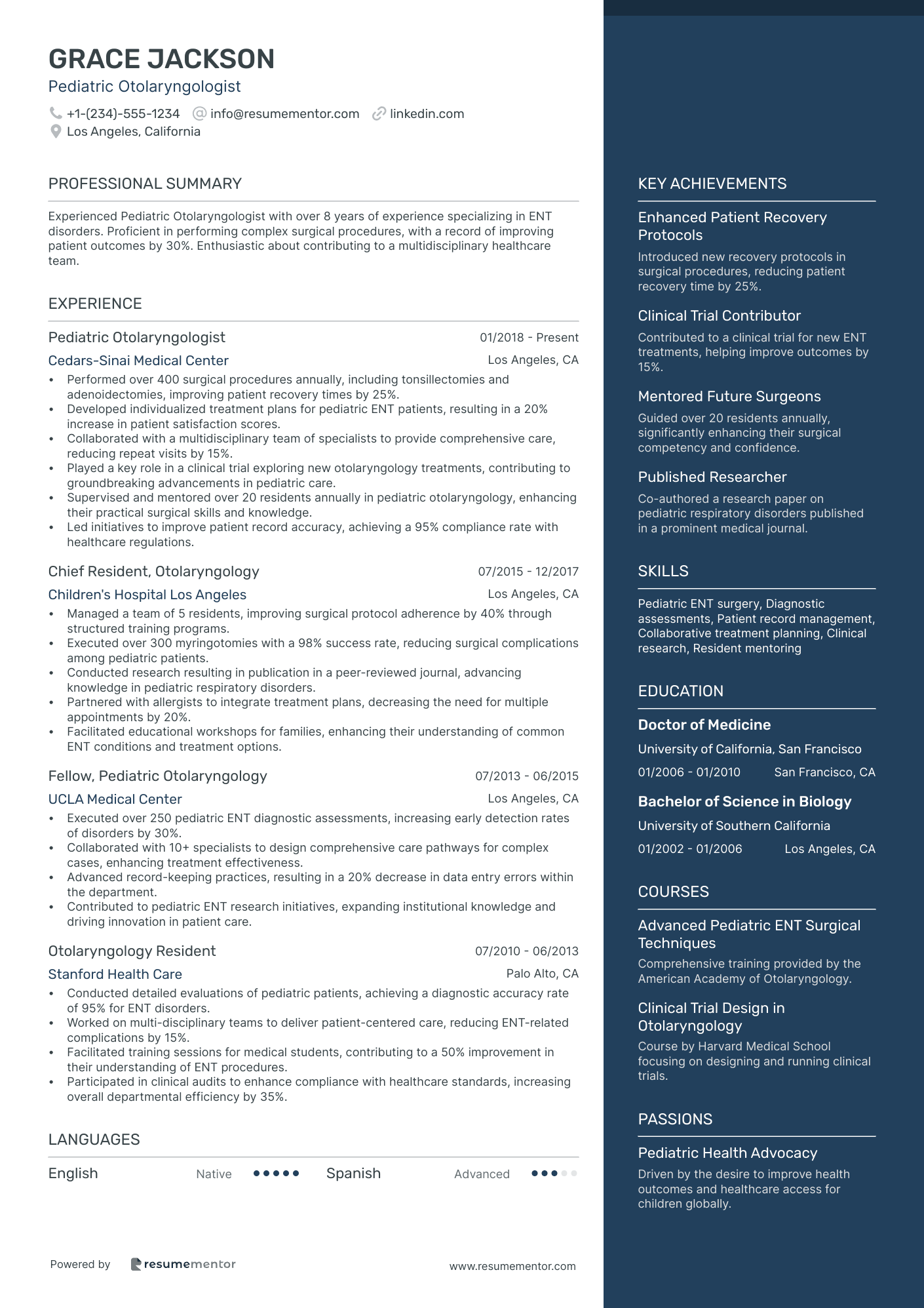
Pediatric Otolaryngologist
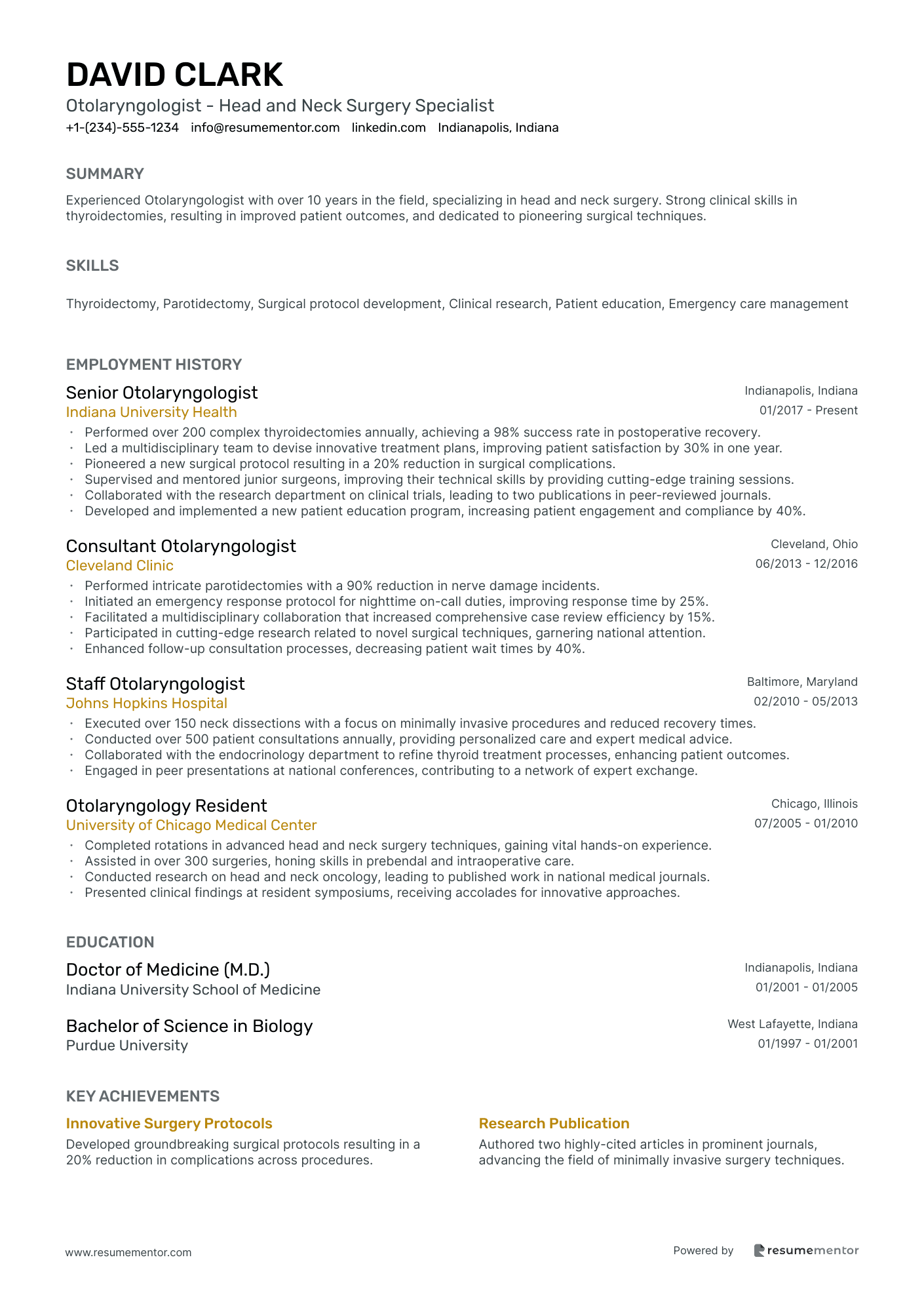
Otolaryngologist - Head and Neck Surgery Specialist
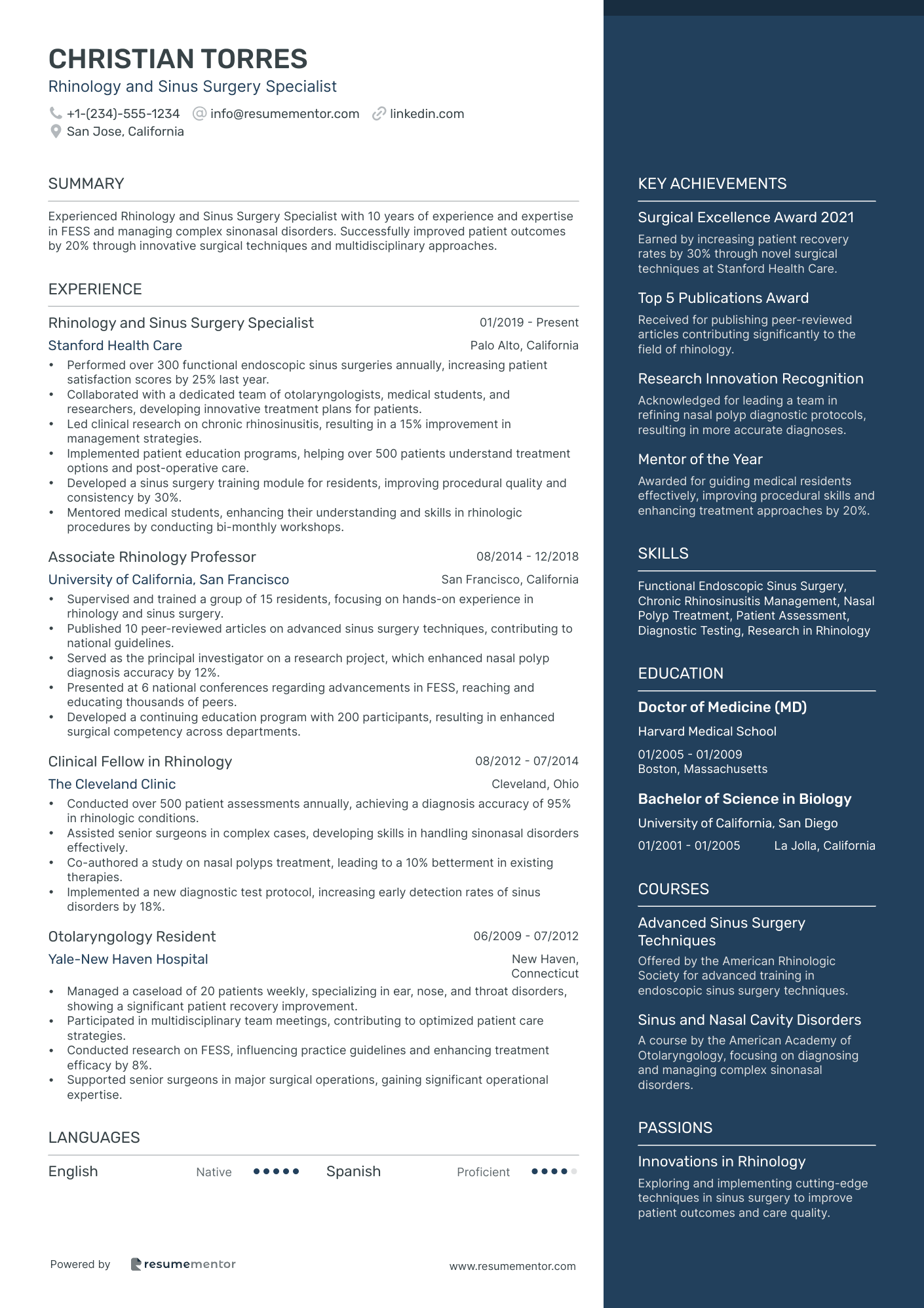
Rhinology and Sinus Surgery Specialist
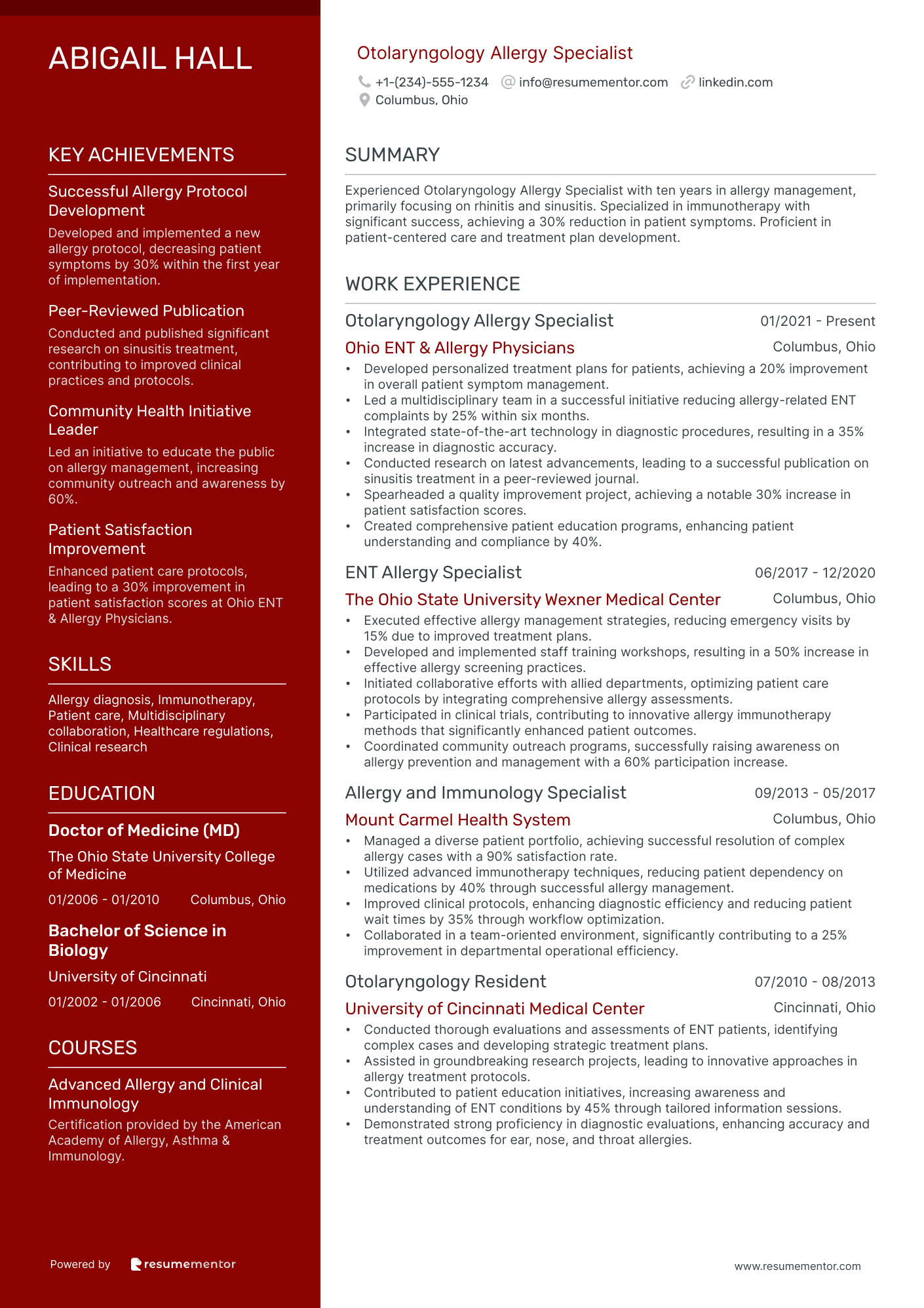
Otolaryngology Allergy Specialist
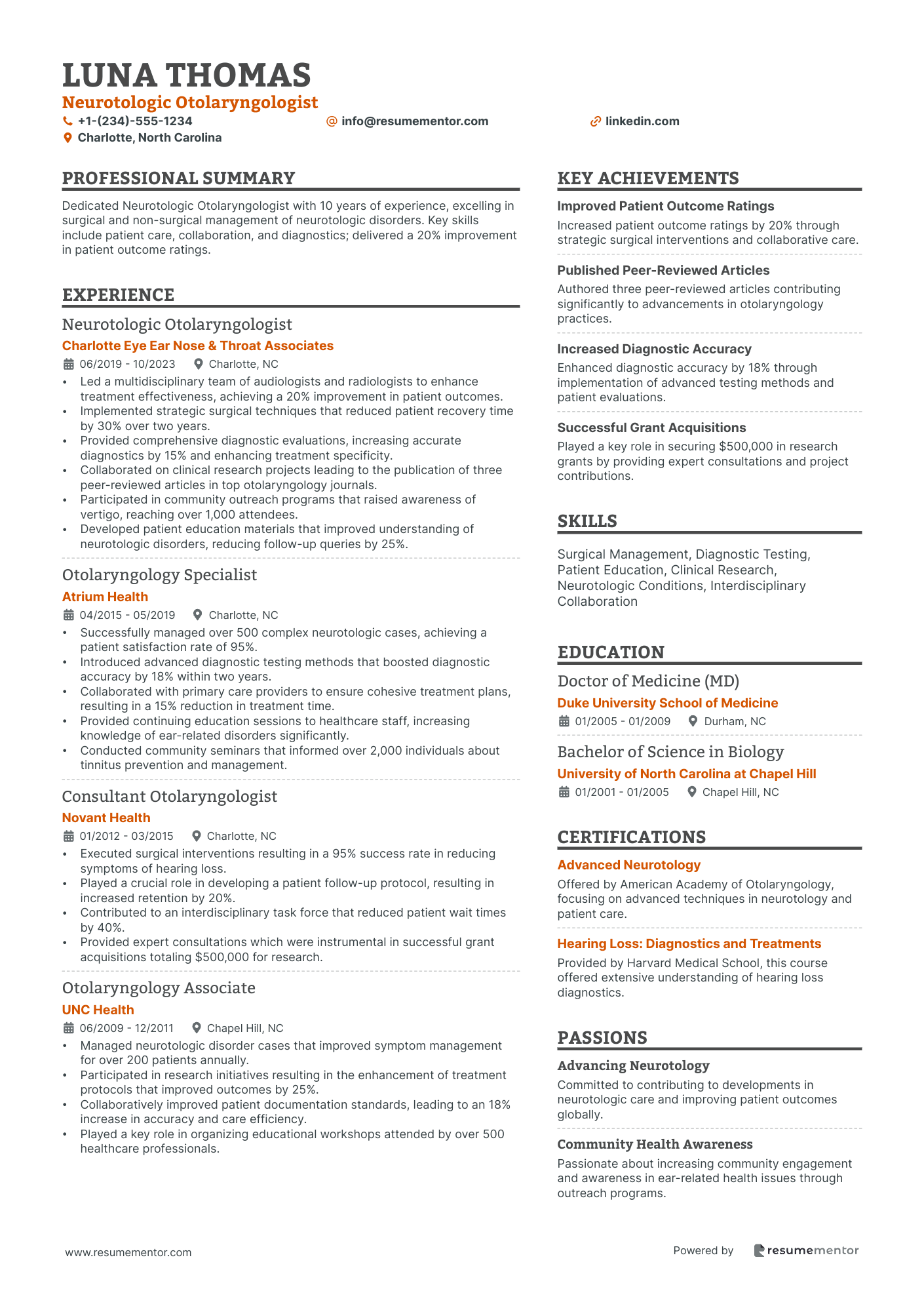
Neurotologic Otolaryngologist
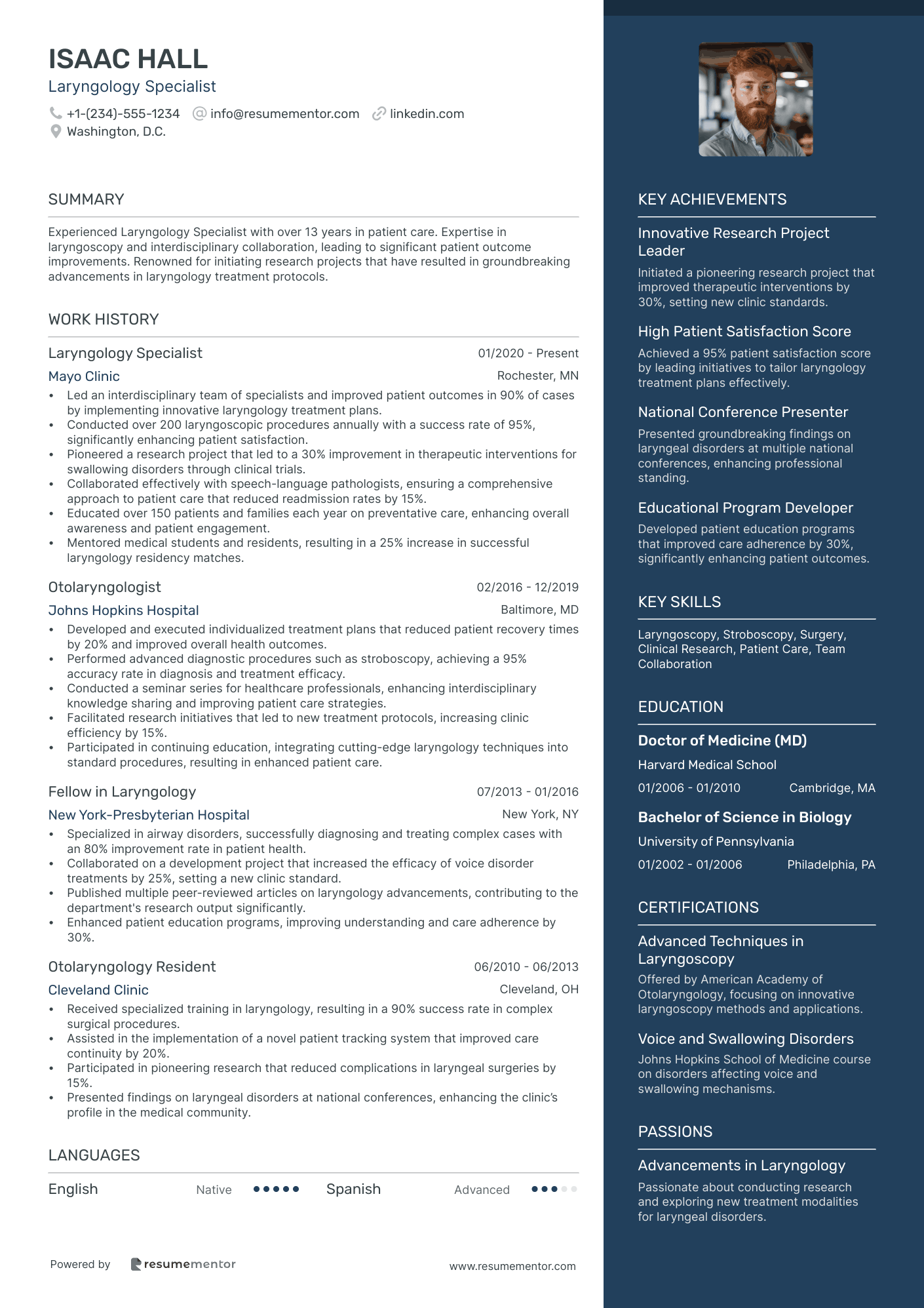
Laryngology Specialist
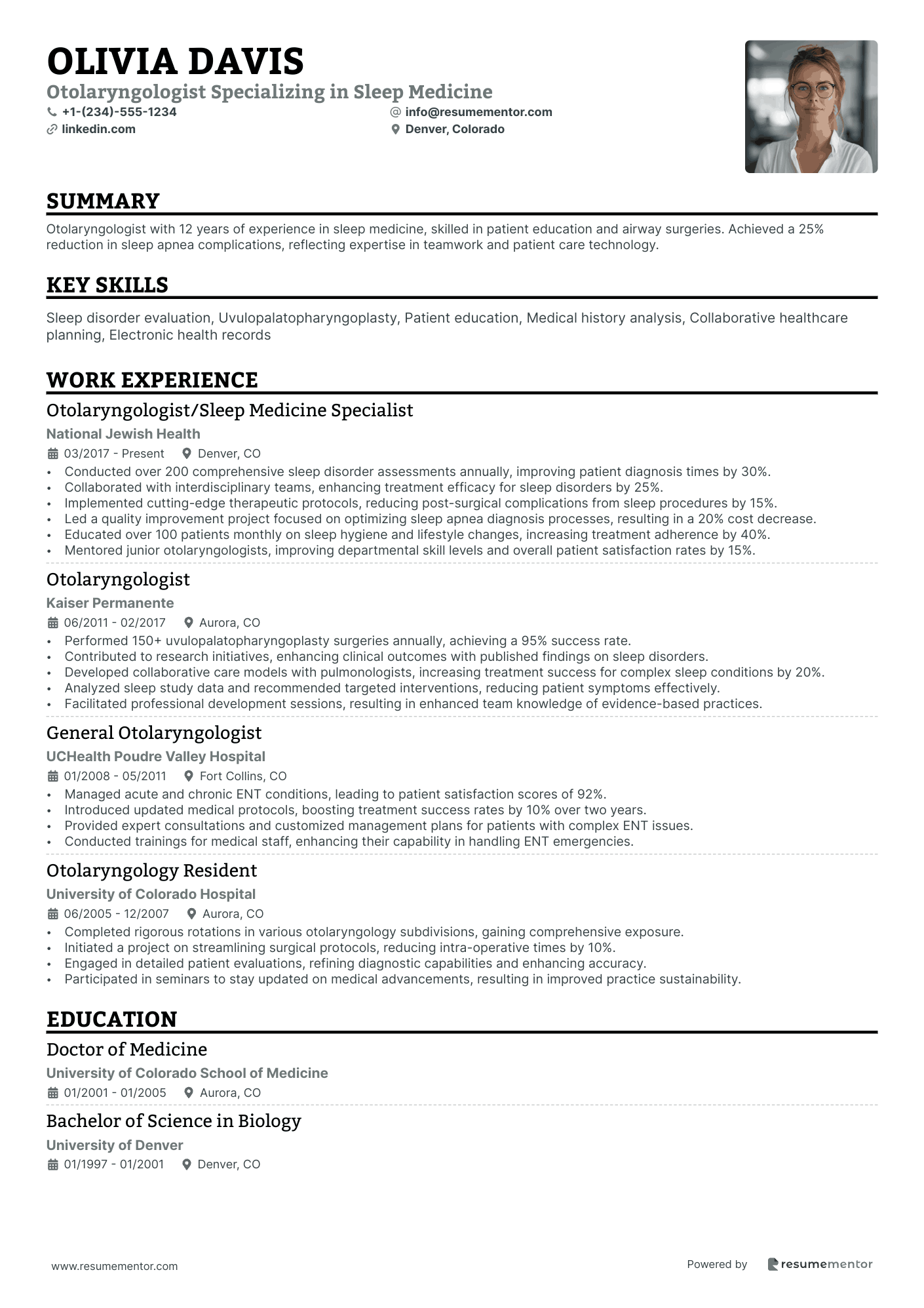
Otolaryngologist Specializing in Sleep Medicine
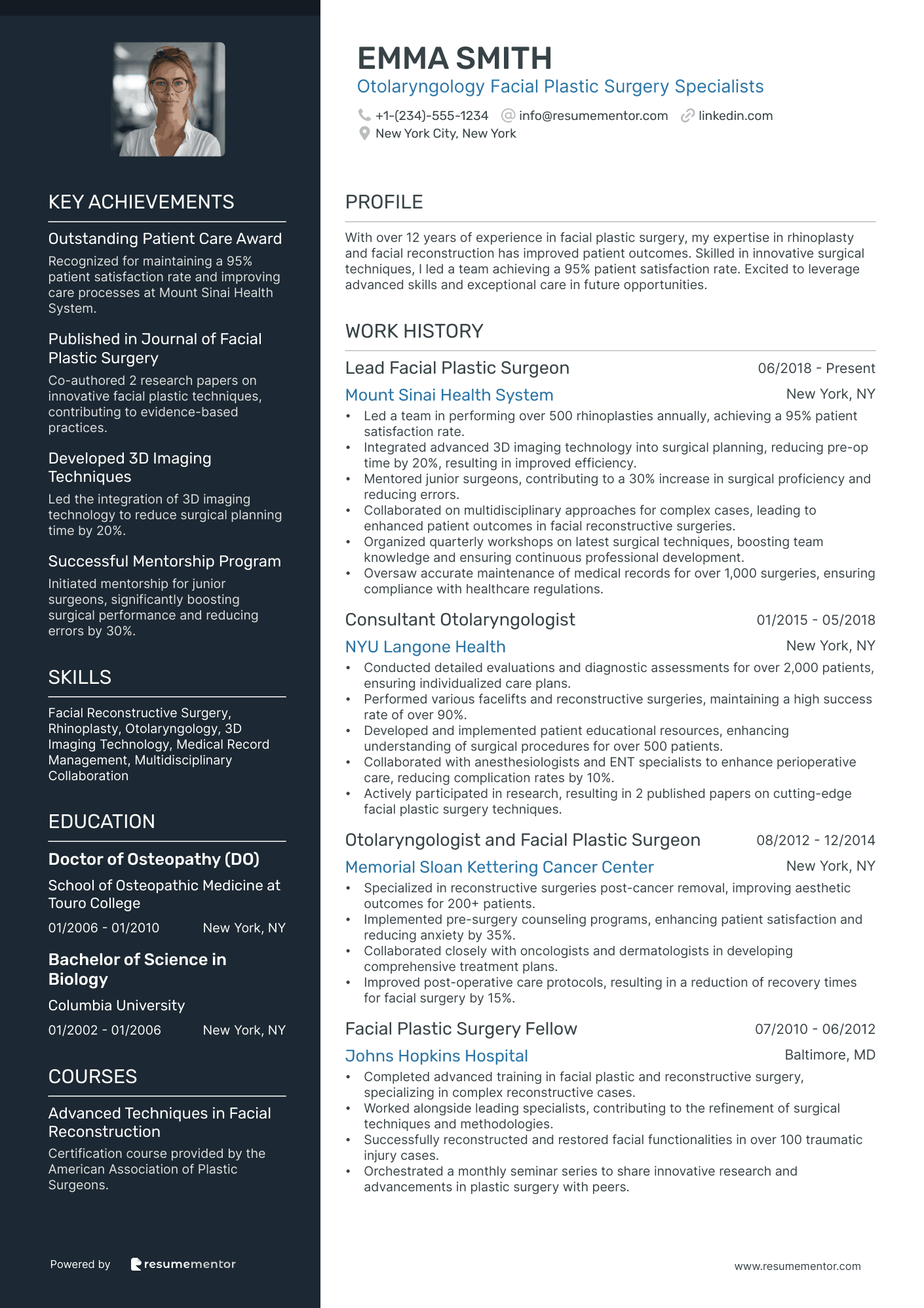
Otolaryngology Facial Plastic Surgery Specialists
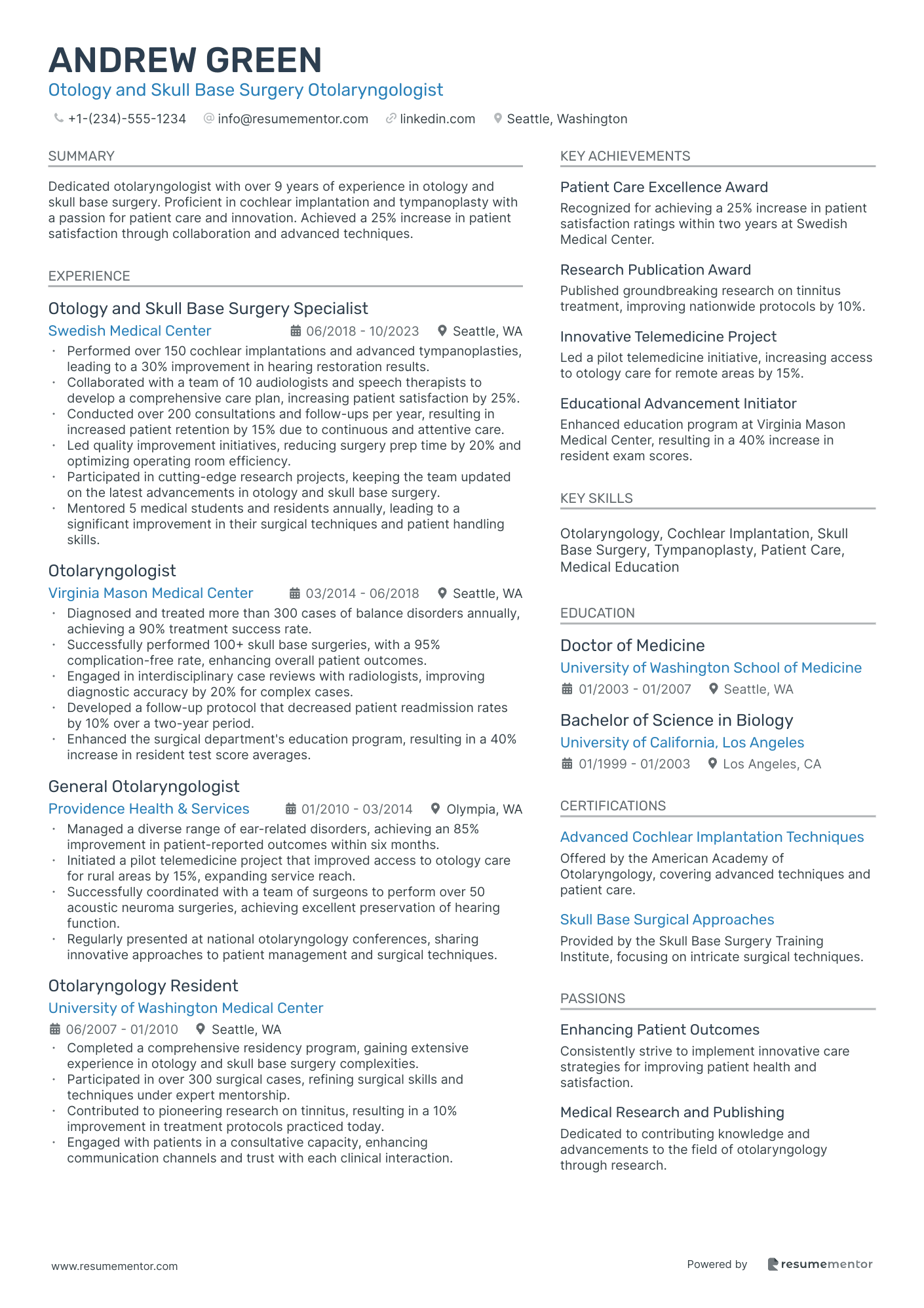
Otology and Skull Base Surgery Otolaryngologist
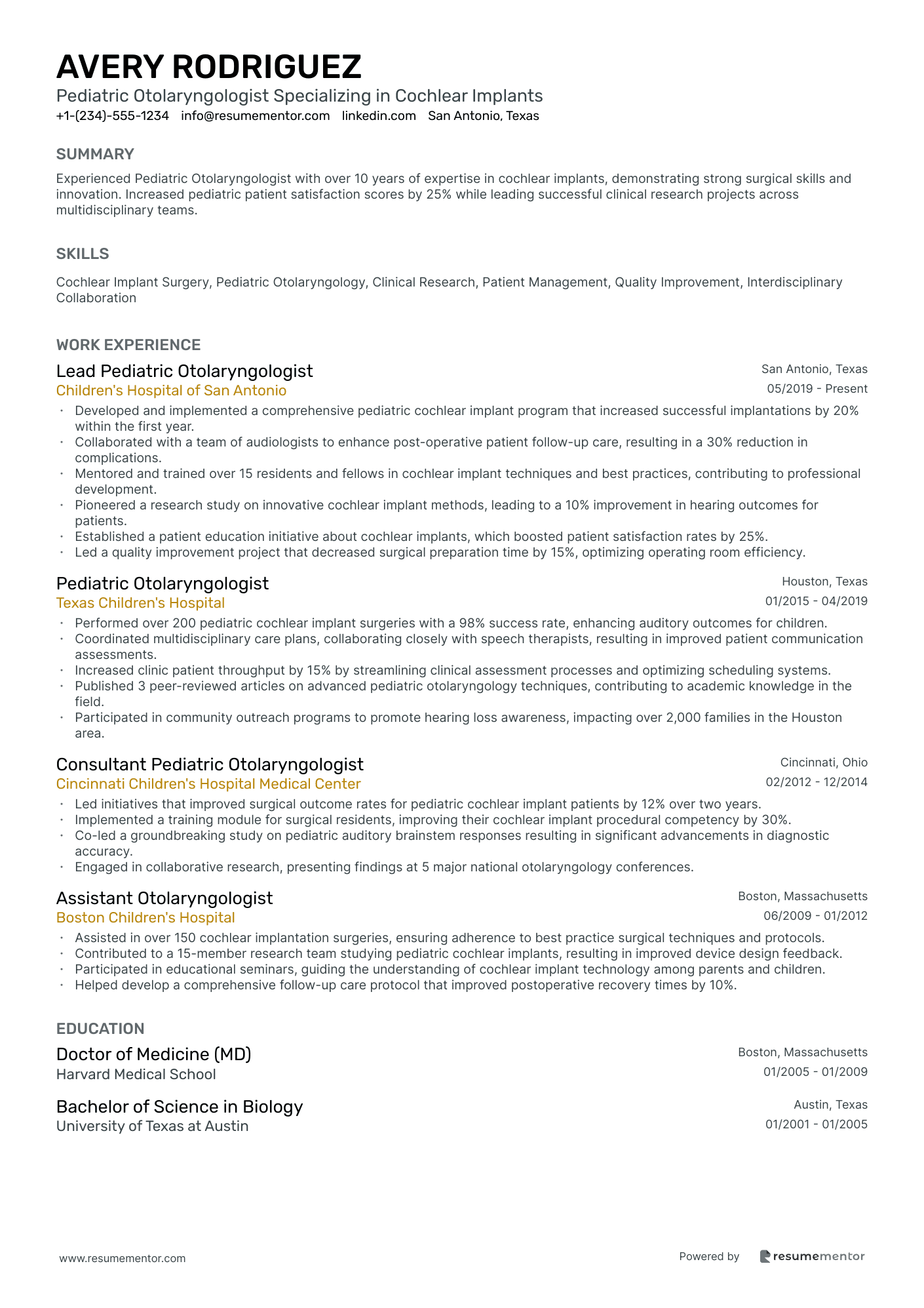
Pediatric Otolaryngologist Specializing in Cochlear Implants

Pediatric Otolaryngologist resume sample
- •Performed over 400 surgical procedures annually, including tonsillectomies and adenoidectomies, improving patient recovery times by 25%.
- •Developed individualized treatment plans for pediatric ENT patients, resulting in a 20% increase in patient satisfaction scores.
- •Collaborated with a multidisciplinary team of specialists to provide comprehensive care, reducing repeat visits by 15%.
- •Played a key role in a clinical trial exploring new otolaryngology treatments, contributing to groundbreaking advancements in pediatric care.
- •Supervised and mentored over 20 residents annually in pediatric otolaryngology, enhancing their practical surgical skills and knowledge.
- •Led initiatives to improve patient record accuracy, achieving a 95% compliance rate with healthcare regulations.
- •Managed a team of 5 residents, improving surgical protocol adherence by 40% through structured training programs.
- •Executed over 300 myringotomies with a 98% success rate, reducing surgical complications among pediatric patients.
- •Conducted research resulting in publication in a peer-reviewed journal, advancing knowledge in pediatric respiratory disorders.
- •Partnered with allergists to integrate treatment plans, decreasing the need for multiple appointments by 20%.
- •Facilitated educational workshops for families, enhancing their understanding of common ENT conditions and treatment options.
- •Executed over 250 pediatric ENT diagnostic assessments, increasing early detection rates of disorders by 30%.
- •Collaborated with 10+ specialists to design comprehensive care pathways for complex cases, enhancing treatment effectiveness.
- •Advanced record-keeping practices, resulting in a 20% decrease in data entry errors within the department.
- •Contributed to pediatric ENT research initiatives, expanding institutional knowledge and driving innovation in patient care.
- •Conducted detailed evaluations of pediatric patients, achieving a diagnostic accuracy rate of 95% for ENT disorders.
- •Worked on multi-disciplinary teams to deliver patient-centered care, reducing ENT-related complications by 15%.
- •Facilitated training sessions for medical students, contributing to a 50% improvement in their understanding of ENT procedures.
- •Participated in clinical audits to enhance compliance with healthcare standards, increasing overall departmental efficiency by 35%.
Otolaryngologist - Head and Neck Surgery Specialist resume sample
- •Performed over 200 complex thyroidectomies annually, achieving a 98% success rate in postoperative recovery.
- •Led a multidisciplinary team to devise innovative treatment plans, improving patient satisfaction by 30% in one year.
- •Pioneered a new surgical protocol resulting in a 20% reduction in surgical complications.
- •Supervised and mentored junior surgeons, improving their technical skills by providing cutting-edge training sessions.
- •Collaborated with the research department on clinical trials, leading to two publications in peer-reviewed journals.
- •Developed and implemented a new patient education program, increasing patient engagement and compliance by 40%.
- •Performed intricate parotidectomies with a 90% reduction in nerve damage incidents.
- •Initiated an emergency response protocol for nighttime on-call duties, improving response time by 25%.
- •Facilitated a multidisciplinary collaboration that increased comprehensive case review efficiency by 15%.
- •Participated in cutting-edge research related to novel surgical techniques, garnering national attention.
- •Enhanced follow-up consultation processes, decreasing patient wait times by 40%.
- •Executed over 150 neck dissections with a focus on minimally invasive procedures and reduced recovery times.
- •Conducted over 500 patient consultations annually, providing personalized care and expert medical advice.
- •Collaborated with the endocrinology department to refine thyroid treatment processes, enhancing patient outcomes.
- •Engaged in peer presentations at national conferences, contributing to a network of expert exchange.
- •Completed rotations in advanced head and neck surgery techniques, gaining vital hands-on experience.
- •Assisted in over 300 surgeries, honing skills in prebendal and intraoperative care.
- •Conducted research on head and neck oncology, leading to published work in national medical journals.
- •Presented clinical findings at resident symposiums, receiving accolades for innovative approaches.
Rhinology and Sinus Surgery Specialist resume sample
- •Performed over 300 functional endoscopic sinus surgeries annually, increasing patient satisfaction scores by 25% last year.
- •Collaborated with a dedicated team of otolaryngologists, medical students, and researchers, developing innovative treatment plans for patients.
- •Led clinical research on chronic rhinosinusitis, resulting in a 15% improvement in management strategies.
- •Implemented patient education programs, helping over 500 patients understand treatment options and post-operative care.
- •Developed a sinus surgery training module for residents, improving procedural quality and consistency by 30%.
- •Mentored medical students, enhancing their understanding and skills in rhinologic procedures by conducting bi-monthly workshops.
- •Supervised and trained a group of 15 residents, focusing on hands-on experience in rhinology and sinus surgery.
- •Published 10 peer-reviewed articles on advanced sinus surgery techniques, contributing to national guidelines.
- •Served as the principal investigator on a research project, which enhanced nasal polyp diagnosis accuracy by 12%.
- •Presented at 6 national conferences regarding advancements in FESS, reaching and educating thousands of peers.
- •Developed a continuing education program with 200 participants, resulting in enhanced surgical competency across departments.
- •Conducted over 500 patient assessments annually, achieving a diagnosis accuracy of 95% in rhinologic conditions.
- •Assisted senior surgeons in complex cases, developing skills in handling sinonasal disorders effectively.
- •Co-authored a study on nasal polyps treatment, leading to a 10% betterment in existing therapies.
- •Implemented a new diagnostic test protocol, increasing early detection rates of sinus disorders by 18%.
- •Managed a caseload of 20 patients weekly, specializing in ear, nose, and throat disorders, showing a significant patient recovery improvement.
- •Participated in multidisciplinary team meetings, contributing to optimized patient care strategies.
- •Conducted research on FESS, influencing practice guidelines and enhancing treatment efficacy by 8%.
- •Supported senior surgeons in major surgical operations, gaining significant operational expertise.
Otolaryngology Allergy Specialist resume sample
- •Developed personalized treatment plans for patients, achieving a 20% improvement in overall patient symptom management.
- •Led a multidisciplinary team in a successful initiative reducing allergy-related ENT complaints by 25% within six months.
- •Integrated state-of-the-art technology in diagnostic procedures, resulting in a 35% increase in diagnostic accuracy.
- •Conducted research on latest advancements, leading to a successful publication on sinusitis treatment in a peer-reviewed journal.
- •Spearheaded a quality improvement project, achieving a notable 30% increase in patient satisfaction scores.
- •Created comprehensive patient education programs, enhancing patient understanding and compliance by 40%.
- •Executed effective allergy management strategies, reducing emergency visits by 15% due to improved treatment plans.
- •Developed and implemented staff training workshops, resulting in a 50% increase in effective allergy screening practices.
- •Initiated collaborative efforts with allied departments, optimizing patient care protocols by integrating comprehensive allergy assessments.
- •Participated in clinical trials, contributing to innovative allergy immunotherapy methods that significantly enhanced patient outcomes.
- •Coordinated community outreach programs, successfully raising awareness on allergy prevention and management with a 60% participation increase.
- •Managed a diverse patient portfolio, achieving successful resolution of complex allergy cases with a 90% satisfaction rate.
- •Utilized advanced immunotherapy techniques, reducing patient dependency on medications by 40% through successful allergy management.
- •Improved clinical protocols, enhancing diagnostic efficiency and reducing patient wait times by 35% through workflow optimization.
- •Collaborated in a team-oriented environment, significantly contributing to a 25% improvement in departmental operational efficiency.
- •Conducted thorough evaluations and assessments of ENT patients, identifying complex cases and developing strategic treatment plans.
- •Assisted in groundbreaking research projects, leading to innovative approaches in allergy treatment protocols.
- •Contributed to patient education initiatives, increasing awareness and understanding of ENT conditions by 45% through tailored information sessions.
- •Demonstrated strong proficiency in diagnostic evaluations, enhancing accuracy and treatment outcomes for ear, nose, and throat allergies.
Neurotologic Otolaryngologist resume sample
- •Led a multidisciplinary team of audiologists and radiologists to enhance treatment effectiveness, achieving a 20% improvement in patient outcomes.
- •Implemented strategic surgical techniques that reduced patient recovery time by 30% over two years.
- •Provided comprehensive diagnostic evaluations, increasing accurate diagnostics by 15% and enhancing treatment specificity.
- •Collaborated on clinical research projects leading to the publication of three peer-reviewed articles in top otolaryngology journals.
- •Participated in community outreach programs that raised awareness of vertigo, reaching over 1,000 attendees.
- •Developed patient education materials that improved understanding of neurotologic disorders, reducing follow-up queries by 25%.
- •Successfully managed over 500 complex neurotologic cases, achieving a patient satisfaction rate of 95%.
- •Introduced advanced diagnostic testing methods that boosted diagnostic accuracy by 18% within two years.
- •Collaborated with primary care providers to ensure cohesive treatment plans, resulting in a 15% reduction in treatment time.
- •Provided continuing education sessions to healthcare staff, increasing knowledge of ear-related disorders significantly.
- •Conducted community seminars that informed over 2,000 individuals about tinnitus prevention and management.
- •Executed surgical interventions resulting in a 95% success rate in reducing symptoms of hearing loss.
- •Played a crucial role in developing a patient follow-up protocol, resulting in increased retention by 20%.
- •Contributed to an interdisciplinary task force that reduced patient wait times by 40%.
- •Provided expert consultations which were instrumental in successful grant acquisitions totaling $500,000 for research.
- •Managed neurotologic disorder cases that improved symptom management for over 200 patients annually.
- •Participated in research initiatives resulting in the enhancement of treatment protocols that improved outcomes by 25%.
- •Collaboratively improved patient documentation standards, leading to an 18% increase in accuracy and care efficiency.
- •Played a key role in organizing educational workshops attended by over 500 healthcare professionals.
Laryngology Specialist resume sample
- •Led an interdisciplinary team of specialists and improved patient outcomes in 90% of cases by implementing innovative laryngology treatment plans.
- •Conducted over 200 laryngoscopic procedures annually with a success rate of 95%, significantly enhancing patient satisfaction.
- •Pioneered a research project that led to a 30% improvement in therapeutic interventions for swallowing disorders through clinical trials.
- •Collaborated effectively with speech-language pathologists, ensuring a comprehensive approach to patient care that reduced readmission rates by 15%.
- •Educated over 150 patients and families each year on preventative care, enhancing overall awareness and patient engagement.
- •Mentored medical students and residents, resulting in a 25% increase in successful laryngology residency matches.
- •Developed and executed individualized treatment plans that reduced patient recovery times by 20% and improved overall health outcomes.
- •Performed advanced diagnostic procedures such as stroboscopy, achieving a 95% accuracy rate in diagnosis and treatment efficacy.
- •Conducted a seminar series for healthcare professionals, enhancing interdisciplinary knowledge sharing and improving patient care strategies.
- •Facilitated research initiatives that led to new treatment protocols, increasing clinic efficiency by 15%.
- •Participated in continuing education, integrating cutting-edge laryngology techniques into standard procedures, resulting in enhanced patient care.
- •Specialized in airway disorders, successfully diagnosing and treating complex cases with an 80% improvement rate in patient health.
- •Collaborated on a development project that increased the efficacy of voice disorder treatments by 25%, setting a new clinic standard.
- •Published multiple peer-reviewed articles on laryngology advancements, contributing to the department's research output significantly.
- •Enhanced patient education programs, improving understanding and care adherence by 30%.
- •Received specialized training in laryngology, resulting in a 90% success rate in complex surgical procedures.
- •Assisted in the implementation of a novel patient tracking system that improved care continuity by 20%.
- •Participated in pioneering research that reduced complications in laryngeal surgeries by 15%.
- •Presented findings on laryngeal disorders at national conferences, enhancing the clinic’s profile in the medical community.
Otolaryngologist Specializing in Sleep Medicine resume sample
- •Conducted over 200 comprehensive sleep disorder assessments annually, improving patient diagnosis times by 30%.
- •Collaborated with interdisciplinary teams, enhancing treatment efficacy for sleep disorders by 25%.
- •Implemented cutting-edge therapeutic protocols, reducing post-surgical complications from sleep procedures by 15%.
- •Led a quality improvement project focused on optimizing sleep apnea diagnosis processes, resulting in a 20% cost decrease.
- •Educated over 100 patients monthly on sleep hygiene and lifestyle changes, increasing treatment adherence by 40%.
- •Mentored junior otolaryngologists, improving departmental skill levels and overall patient satisfaction rates by 15%.
- •Performed 150+ uvulopalatopharyngoplasty surgeries annually, achieving a 95% success rate.
- •Contributed to research initiatives, enhancing clinical outcomes with published findings on sleep disorders.
- •Developed collaborative care models with pulmonologists, increasing treatment success for complex sleep conditions by 20%.
- •Analyzed sleep study data and recommended targeted interventions, reducing patient symptoms effectively.
- •Facilitated professional development sessions, resulting in enhanced team knowledge of evidence-based practices.
- •Managed acute and chronic ENT conditions, leading to patient satisfaction scores of 92%.
- •Introduced updated medical protocols, boosting treatment success rates by 10% over two years.
- •Provided expert consultations and customized management plans for patients with complex ENT issues.
- •Conducted trainings for medical staff, enhancing their capability in handling ENT emergencies.
- •Completed rigorous rotations in various otolaryngology subdivisions, gaining comprehensive exposure.
- •Initiated a project on streamlining surgical protocols, reducing intra-operative times by 10%.
- •Engaged in detailed patient evaluations, refining diagnostic capabilities and enhancing accuracy.
- •Participated in seminars to stay updated on medical advancements, resulting in improved practice sustainability.
Otolaryngology Facial Plastic Surgery Specialists resume sample
- •Led a team in performing over 500 rhinoplasties annually, achieving a 95% patient satisfaction rate.
- •Integrated advanced 3D imaging technology into surgical planning, reducing pre-op time by 20%, resulting in improved efficiency.
- •Mentored junior surgeons, contributing to a 30% increase in surgical proficiency and reducing errors.
- •Collaborated on multidisciplinary approaches for complex cases, leading to enhanced patient outcomes in facial reconstructive surgeries.
- •Organized quarterly workshops on latest surgical techniques, boosting team knowledge and ensuring continuous professional development.
- •Oversaw accurate maintenance of medical records for over 1,000 surgeries, ensuring compliance with healthcare regulations.
- •Conducted detailed evaluations and diagnostic assessments for over 2,000 patients, ensuring individualized care plans.
- •Performed various facelifts and reconstructive surgeries, maintaining a high success rate of over 90%.
- •Developed and implemented patient educational resources, enhancing understanding of surgical procedures for over 500 patients.
- •Collaborated with anesthesiologists and ENT specialists to enhance perioperative care, reducing complication rates by 10%.
- •Actively participated in research, resulting in 2 published papers on cutting-edge facial plastic surgery techniques.
- •Specialized in reconstructive surgeries post-cancer removal, improving aesthetic outcomes for 200+ patients.
- •Implemented pre-surgery counseling programs, enhancing patient satisfaction and reducing anxiety by 35%.
- •Collaborated closely with oncologists and dermatologists in developing comprehensive treatment plans.
- •Improved post-operative care protocols, resulting in a reduction of recovery times for facial surgery by 15%.
- •Completed advanced training in facial plastic and reconstructive surgery, specializing in complex reconstructive cases.
- •Worked alongside leading specialists, contributing to the refinement of surgical techniques and methodologies.
- •Successfully reconstructed and restored facial functionalities in over 100 traumatic injury cases.
- •Orchestrated a monthly seminar series to share innovative research and advancements in plastic surgery with peers.
Otology and Skull Base Surgery Otolaryngologist resume sample
- •Performed over 150 cochlear implantations and advanced tympanoplasties, leading to a 30% improvement in hearing restoration results.
- •Collaborated with a team of 10 audiologists and speech therapists to develop a comprehensive care plan, increasing patient satisfaction by 25%.
- •Conducted over 200 consultations and follow-ups per year, resulting in increased patient retention by 15% due to continuous and attentive care.
- •Led quality improvement initiatives, reducing surgery prep time by 20% and optimizing operating room efficiency.
- •Participated in cutting-edge research projects, keeping the team updated on the latest advancements in otology and skull base surgery.
- •Mentored 5 medical students and residents annually, leading to a significant improvement in their surgical techniques and patient handling skills.
- •Diagnosed and treated more than 300 cases of balance disorders annually, achieving a 90% treatment success rate.
- •Successfully performed 100+ skull base surgeries, with a 95% complication-free rate, enhancing overall patient outcomes.
- •Engaged in interdisciplinary case reviews with radiologists, improving diagnostic accuracy by 20% for complex cases.
- •Developed a follow-up protocol that decreased patient readmission rates by 10% over a two-year period.
- •Enhanced the surgical department's education program, resulting in a 40% increase in resident test score averages.
- •Managed a diverse range of ear-related disorders, achieving an 85% improvement in patient-reported outcomes within six months.
- •Initiated a pilot telemedicine project that improved access to otology care for rural areas by 15%, expanding service reach.
- •Successfully coordinated with a team of surgeons to perform over 50 acoustic neuroma surgeries, achieving excellent preservation of hearing function.
- •Regularly presented at national otolaryngology conferences, sharing innovative approaches to patient management and surgical techniques.
- •Completed a comprehensive residency program, gaining extensive experience in otology and skull base surgery complexities.
- •Participated in over 300 surgical cases, refining surgical skills and techniques under expert mentorship.
- •Contributed to pioneering research on tinnitus, resulting in a 10% improvement in treatment protocols practiced today.
- •Engaged with patients in a consultative capacity, enhancing communication channels and trust with each clinical interaction.
Pediatric Otolaryngologist Specializing in Cochlear Implants resume sample
- •Developed and implemented a comprehensive pediatric cochlear implant program that increased successful implantations by 20% within the first year.
- •Collaborated with a team of audiologists to enhance post-operative patient follow-up care, resulting in a 30% reduction in complications.
- •Mentored and trained over 15 residents and fellows in cochlear implant techniques and best practices, contributing to professional development.
- •Pioneered a research study on innovative cochlear implant methods, leading to a 10% improvement in hearing outcomes for patients.
- •Established a patient education initiative about cochlear implants, which boosted patient satisfaction rates by 25%.
- •Led a quality improvement project that decreased surgical preparation time by 15%, optimizing operating room efficiency.
- •Performed over 200 pediatric cochlear implant surgeries with a 98% success rate, enhancing auditory outcomes for children.
- •Coordinated multidisciplinary care plans, collaborating closely with speech therapists, resulting in improved patient communication assessments.
- •Increased clinic patient throughput by 15% by streamlining clinical assessment processes and optimizing scheduling systems.
- •Published 3 peer-reviewed articles on advanced pediatric otolaryngology techniques, contributing to academic knowledge in the field.
- •Participated in community outreach programs to promote hearing loss awareness, impacting over 2,000 families in the Houston area.
- •Led initiatives that improved surgical outcome rates for pediatric cochlear implant patients by 12% over two years.
- •Implemented a training module for surgical residents, improving their cochlear implant procedural competency by 30%.
- •Co-led a groundbreaking study on pediatric auditory brainstem responses resulting in significant advancements in diagnostic accuracy.
- •Engaged in collaborative research, presenting findings at 5 major national otolaryngology conferences.
- •Assisted in over 150 cochlear implantation surgeries, ensuring adherence to best practice surgical techniques and protocols.
- •Contributed to a 15-member research team studying pediatric cochlear implants, resulting in improved device design feedback.
- •Participated in educational seminars, guiding the understanding of cochlear implant technology among parents and children.
- •Helped develop a comprehensive follow-up care protocol that improved postoperative recovery times by 10%.
As an otolaryngologist, crafting a resume can feel like navigating a complex case, weaving your skills in ear, nose, and throat care into a compelling narrative. Your expertise is clear, but the challenge lies in presenting your unique talents and successes in a way that captivates potential employers. This task can often seem overwhelming, as deciding where to begin with your extensive experience is daunting, much like diagnosing without the right tools.
Here, the value of a resume template becomes evident. With structured guidance, you can seamlessly highlight key details like your surgical experience and patient care skills, transforming your dense experience into a coherent story. Effective organization can be easily achieved with customizable options, such as those found in resume templates, ensuring your strengths shine through.
A well-structured format not only saves you time but also ensures that your resume stands out in a competitive job landscape. It allows you to focus on the heart of your resume—your accomplishments and dedication to patient care. Remember, a polished resume is your first handshake with potential employers, setting the stage for your level of commitment and professionalism. You’ve dedicated yourself to excel in your field; let your resume mirror that same fervor and expertise.
Key Takeaways
- Utilize a structured resume template to present complex medical experience effectively and emphasize key areas like surgical achievements and patient care.
- Craft a well-organized resume that aligns with ATS, focusing on significant accomplishments, licensure, medical education, and specialized training in otolaryngology.
- Choose a chronological format with consistent and modern font styles, save as PDF for clear presentation, and maintain one-inch margins for readability.
- Highlight quantifiable achievements in the experience section, using active verbs and integrating keywords to align with the job description.
- Include a strong skills section that balances technical and interpersonal abilities, and showcase related certificates, maintaining relevance to otolaryngology.
What to focus on when writing your otolaryngologist resume
An otolaryngologist resume should effectively convey your expertise in ear, nose, and throat health, emphasizing your ability to deliver exceptional patient care. From the moment recruiters see your resume, they should recognize your specialized skills and experience in the field. Demonstrating your achievements, education, and dedication to professional growth is key to showing you're the right fit for the role. It's important to use a well-organized format that aligns with Applicant Tracking Systems (ATS) for smooth communication.
How to structure your otolaryngologist resume
- Start with your contact information—ensuring your full name, phone number, email, and LinkedIn profile are up-to-date and professional is crucial. This section sets the stage for how easy it will be for recruiters to connect with you and ensures there's no hurdle in reaching out for the next steps.
- Then, craft a professional summary that offers a quick snapshot of your ENT expertise, years of experience, and key qualifications—this section is your elevator pitch. It allows you to create a strong first impression by aligning your most vital attributes with the job you're targeting, setting the tone for the rest of your resume.
- Next, clearly present your medical licensure and certifications. Listing your state medical license and relevant board certifications, along with issuance dates, allows easy verification for potential employers—this demonstrates your compliance with regulatory standards and underscores your authority in the field.
- In your professional experience section, outline your work history with a focus on relevant roles, underscoring your responsibilities, achievements, and any innovations in patient care or surgical techniques—this is where you showcase your hands-on experience, highlighting your impact and contributions to previous workplaces.
- Follow with your education, specifying your medical degree, the institution, and your graduation year—this establishes your foundational knowledge and training in the field. Adding details about any otolaryngology fellowships or residencies can further enhance your profile by showcasing specialized training.
- Finally, highlight critical skills such as surgical proficiency, patient consultation, and specialized ENT techniques using language that is easily scanned by ATS software—this allows for a quick assessment of your hands-on abilities and readiness for the role.
To enrich your resume even more, consider including additional sections like Publications, Research Experience, or Professional Affiliations. These can help set you apart from other candidates, showcasing your broader contributions to the field. Next, we’ll cover each of these sections in more depth to help you craft a standout otolaryngologist resume.
Which resume format to choose
Crafting a resume as an otolaryngologist requires a format that is both neat and professional. In this specialized medical field, the clarity and organization of your resume significantly impact how potential employers perceive your skills and experience. A chronological format is particularly effective, as it allows you to detail your career progression and leadership roles in a clear, linear way, which is essential for demonstrating your expertise and reliability.
The choice of font is more than just a design preference; it plays a critical role in ensuring your information is presented clearly. Opt for modern fonts like Lato, Montserrat, or Raleway. These fonts offer a professional yet contemporary look that helps your resume stand out while maintaining readability, a crucial factor when conveying complex medical qualifications. Using a consistent font size—10-12 points for the main text with larger headings—ensures your resume is easy to read and navigate.
Saving your resume as a PDF is vital. This file format maintains your layout and formatting across different devices, which is crucial in professions like otolaryngology, where precision and professionalism are paramount. A PDF preserves the integrity of your document, ensuring your credentials are always presented in the best light.
Finally, one-inch margins on all sides provide the necessary white space to make your resume easy to read. This spacing makes your content more approachable and organized, which supports the impression of meticulousness and attention to detail—qualities that are highly valued in the medical field. By focusing on these aspects, you create a resume that effectively highlights your expertise and leaves a lasting impression on potential employers.
How to write a quantifiable resume experience section
An otolaryngologist's resume experience section plays a crucial role in highlighting your medical expertise and notable achievements. To create a compelling narrative, focus on roles that are directly relevant to the job you're targeting, and emphasize your successes in patient care, medical advancements, and leadership. Structure this section with concise bullet points that clearly outline your impact on improving patient outcomes and streamlining healthcare operations, assuring potential employers of your capability.
Begin with your most recent position and list previous roles in reverse chronological order. Emphasize positions held within the last 10-15 years to maintain relevance, unless earlier roles are particularly pertinent. Include job titles that directly align with the job you're pursuing. Tailoring your resume for each application is essential; analyze the job ad and integrate keywords that reflect the qualifications and duties they are seeking, demonstrating your alignment with the employer's priorities.
Select strong action verbs such as "performed," "achieved," "enhanced," and "developed" to communicate your accomplishments with confidence and clarity. Here’s how these strategies might appear in an otolaryngologist's experience section:
- •Performed over 3,000 surgical procedures, improving patient recovery times by 20%
- •Introduced new treatment protocols, reducing complications in sinus surgeries by 15%
- •Led the team to a 95% patient satisfaction rate, consistently surpassing hospital benchmarks
- •Mentored junior otolaryngologists, enhancing operative skills and reducing errors by 30%
This experience section effectively interconnects its elements by focusing on measurable achievements that demonstrate your value. Each bullet point builds upon the last, illustrating significant contributions to patient care and workplace leadership. Highlighting high patient satisfaction and successful mentorship not only showcases your capabilities but also ties your individual achievements to team success. This seamless integration of accomplishments aligns perfectly with potential employers' needs, using direct and active language to present your qualifications clearly and compellingly.
Achievement-Focused resume experience section
An achievement-focused otolaryngologist resume experience section should showcase your most significant accomplishments and the impact you've had in your roles. By emphasizing your successes, you can effectively highlight the value you bring to a team. Use action verbs to kick off each bullet point and provide clear details that demonstrate how your contributions have made a difference. For example, if you've developed a new surgical technique or enhanced patient care, make these achievements prominent. This approach ensures anyone reading your resume can easily grasp your influence in the field.
Begin with listing your employment dates, followed by your job title and the name of your workplace. Each bullet point should smoothly convey a story of success that aligns with the job you're targeting, focusing on relevant skills with straightforward language. By doing this, your resume will not only be more engaging but will also clearly communicate your expertise and the valuable contributions you can offer to a new team.
Chief Otolaryngologist
City Hospital
January 2015 - Present
- Led a team to implement a new patient care protocol, boosting patient satisfaction scores by 25%.
- Pioneered a minimally invasive surgical technique, cutting recovery time by 30%.
- Published five articles in peer-reviewed journals on innovative otolaryngology treatments.
- Helped train over 20 medical residents, enhancing their skills in procedures and patient interactions.
Skills-Focused resume experience section
A skills-focused otolaryngologist resume experience section should spotlight the unique abilities and accomplishments that have defined your professional life. Begin by identifying areas where you excel, such as patient care, surgical prowess, research initiatives, or teaching experiences. Highlight how you've applied these skills in practice, be it in private practice, hospital settings, or academic environments. Use bullet points to clearly outline your achievements, ensuring they reflect expertise relevant to the role you're pursuing.
Connect your ideas by using active verbs that illustrate your successes dynamically. Instead of merely listing tasks, focus on the impact you've had, such as enhancing surgical efficiency by a specific percentage. This highlights not only your skills but also your tangible contributions to improved patient outcomes or team successes. By weaving together your skills and your achievements, you paint a comprehensive picture of your growth and the value you bring as an otolaryngologist.
Otolaryngologist
Advanced ENT Specialists
January 2015 - Present
- Performed over 500 successful ear, nose, and throat surgeries with a 98% patient satisfaction rate.
- Developed a new post-operative care protocol, reducing recovery times by 20% for sinus surgery patients.
- Led a team of 10 in a monthly clinical research meeting, presenting and discussing recent advancements in otolaryngology.
- Trained five medical residents in advanced diagnostic and surgical techniques for common ENT disorders.
Collaboration-Focused resume experience section
A collaboration-focused otolaryngologist resume experience section should emphasize your skills in working closely with various professionals within the healthcare setting. Begin by listing the job titles and places you've worked, and then dive into describing your achievements with an emphasis on teamwork and collaboration. Highlight how your efforts have led to improved patient outcomes through effective partnerships with other medical staff. Keep the language straightforward to ensure your examples are relatable and directly relevant to your field.
Your entries should flow naturally, showcasing leadership and communication skills across diverse situations. Highlight specific projects or initiatives where you've led or contributed to successful teamwork. Mention any cross-functional teams you've been part of and demonstrate how your involvement led to positive changes. Each bullet point should seamlessly link to the idea of collaboration, showing how your role has not only improved operations but also enriched patient care.
Senior Otolaryngologist
City Health Clinic
January 2018 - Present
- Worked with a multi-disciplinary team to set up a new patient referral system, cutting wait times by 30%.
- Teamed up with audiologists and speech therapists to fine-tune treatment plans, boosting service efficiency by 20%.
- Led monthly meetings across departments for case reviews and better patient treatment strategies.
- Coordinated with the administrative team to refresh patient care protocols, ensuring compliance with health regulations.
Responsibility-Focused resume experience section
A responsibility-focused otolaryngologist resume experience section should effectively highlight your core duties and demonstrate your achievements. Start by pinpointing the key responsibilities you managed, and illustrate them with specific examples. This approach helps convey your expertise and shows how you can apply your skills in future roles. Sharing what you accomplished in these areas offers a clearer idea of your capabilities.
Present your achievements in bullet points to make them stand out and ensure readability. Use clear, simple language to describe each task, ensuring that it's easy for potential employers to understand. Emphasize your involvement in leadership roles, innovative projects, or successful surgeries as these demonstrate the value you bring. Highlighting such contributions paints a comprehensive picture of your ability to enhance team performance and patient care.
Otolaryngologist
St. Mary's Medical Center
January 2020 - Present
- Managed patient consultations, precisely diagnosing ear, nose, and throat conditions.
- Crafted personalized treatment plans, boosting patient satisfaction by 20%.
- Collaborated on complex surgeries with specialists, improving recovery rates.
- Led educational seminars that kept staff updated on the latest otolaryngology technologies.
Write your otolaryngologist resume summary section
A patient-focused otolaryngologist resume should start with a compelling summary to boost your chances and make a strong first impression. This section should spotlight your unique skills and achievements, demonstrating what makes you stand out. When you highlight how you can benefit a potential employer, the summary becomes even more effective. It's essential to keep this part clear and concise to maintain engagement. Experienced professionals should showcase their expertise and career accomplishments, while those newer to the field might focus on a resume objective that reveals their career goals and enthusiasm to grow. Strive to balance professionalism with an engaging tone to draw the reader in.
For experienced otolaryngologists, consider this summary:
This summary effectively underscores essential expertise while highlighting compassionate care, positioning you as a seasoned professional. Each sentence is crafted to highlight significant achievements. On the other hand, those new to the field might prefer a resume objective, focusing on future contributions and growth.
For someone starting in otolaryngology:
[here was the JSON object 2]
This objective presents clear goals and readiness to contribute, drawing attention to potential rather than experience. When choosing between a summary, resume profile, or summary of qualifications, consider each format's ability to best showcase your experience and strengths in a concise manner.
Listing your otolaryngologist skills on your resume
A skills-focused otolaryngologist resume should effectively highlight both your technical and interpersonal abilities. Your skills section is crucial—you can choose to have it stand alone or blend it into your experience and summary sections. While technical strengths, or hard skills, demonstrate your expertise in medical procedures, soft skills showcase your ability to connect with patients and work well with colleagues. Including these skills strategically also transforms them into keywords that grab the attention of employers and applicant tracking systems.
Here's an example of a clear and effective standalone skills section:
This example effectively displays your professional capabilities. It's succinct and directly highlights skills that are critical to otolaryngology, balancing technical know-how with patient-centered care, both vital in your field.
Best hard skills to feature on your otolaryngologist resume
Hard skills are the technical abilities you possess, showcasing your competence in performing medical tasks. They tell employers you can handle surgeries, diagnosis, and specialized practices with confidence.
Hard Skills
- Surgical Expertise
- Diagnostic Skills
- Microsurgery
- Allergy Testing and Treatment
- Audiology
- Endoscopic Examination
- Facial Plastic Surgery
- Head and Neck Oncological Surgery
- Rhinology
- Otology and Neurotology
- Sleep Medicine
- Sinus Surgery
- Laryngology
- Pediatric Otolaryngology
- Voice and Swallowing Disorders
Best soft skills to feature on your otolaryngologist resume
Soft skills enhance your technical skills by showing how you interact with patients and work within a team. These skills reflect your communication abilities, empathy, and teamwork, all essential for an effective healthcare environment.
Soft Skills
- Communication
- Empathy
- Active Listening
- Problem-Solving
- Team Collaboration
- Time Management
- Attention to Detail
- Adaptability
- Critical Thinking
- Leadership
- Patient Education
- Conflict Resolution
- Stress Management
- Decision-Making
- Interpersonal Skills
How to include your education on your resume
An education section is an important part of your resume, especially when applying for specialized positions such as an otolaryngologist. This section demonstrates your academic qualifications that are directly relevant to the job. Tailor the education section to match the job you're targeting; exclude any education that doesn't pertain to the field of otolaryngology. It's also essential to know how to present your GPA if it's noteworthy. Including it can be beneficial, particularly if you graduated with honors. Mention distinctions like cum laude by adding them after your degree title. When listing a degree, start with the degree name, followed by the institution, location, and years attended.
Here’s a wrong example:
- •Performed in various art shows
Now, here’s a right example:
The second example is strong because it clearly presents the degree relevant to an otolaryngologist role, along with honors such as cum laude, which showcases excellence. The inclusion of a high GPA further highlights academic achievements without clutter. The focus remains on the degree and institution, which are crucial for this profession. The concise presentation uses a readable format that employs the right amount of detail for a recruiter's quick review.
How to include otolaryngologist certificates on your resume
In your resume, the certificates section is an essential part that demonstrates your qualifications and expertise. To include this, list the name of each certificate, include the date of issuance, and add the issuing organization. For impact, certificates can also appear in the header along with your name and contact information.
For instance: "Dr. John Doe, MD, Board Certified in Otolaryngology, American Board of Otolaryngology - Head and Neck Surgery, 2019".
Here's a standalone certificates section:
This example is effective because it highlights relevant and prestigious certifications directly related to the field of otolaryngology. Both listed certificates show a high level of expertise and specialization, making you a more attractive candidate. Including the issuing organizations also adds credibility and assures potential employers of your qualifications.
Extra sections to include in your otolaryngologist resume
Crafting a standout resume is crucial for any professional aiming to shine in their field, and otolaryngologists are no exception. This highly specialized medical profession requires showcasing a wide range of competencies and experiences. Including distinct sections such as languages, hobbies, volunteer work, and books can help you stand out and present a well-rounded profile.
- Languages section — Demonstrate fluency in multiple languages to highlight your ability to communicate with a diverse patient base and colleagues. This can be a crucial asset in a multicultural medical environment.
- Hobbies and interests section — Reveal your personal interests to give hiring managers a glimpse of your personality and work-life balance skills. Interests like playing a musical instrument or engaging in team sports can reflect your dedication and teamwork abilities.
- Volunteer work section — Show your commitment to the community and patient care beyond the professional realm. Highlighting volunteer activities such as organizing health camps can demonstrate your dedication to making a positive impact.
- Books section — Share important medical or professional books you've read to underscore your eagerness for continuous learning. Mentioning key titles such as notable medical texts or leadership books can portray you as both knowledgeable and motivated.
Incorporating these sections strategically will back up your credentials and let your unique attributes shine. By weaving in these elements, you present yourself as a multifaceted candidate with a genuine passion for the field.
In Conclusion
In conclusion, presenting yourself as a competent otolaryngologist through a well-curated resume is crucial in today's competitive job market. Your resume acts as your initial handshake with potential employers, showcasing not only your extensive training and achievements but also your dedication to advancing ear, nose, and throat care. By following a structured format, you can effectively highlight your skills and experiences, making sure they align with the job you’re targeting. Using templates to organize your information ensures clarity and allows your expertise to stand out. Incorporating both hard and soft skills demonstrates your ability to handle complex medical procedures while maintaining compassionate patient interactions. Achievements and quantifiable results, such as patient satisfaction rates or innovative surgical techniques, provide compelling evidence of your capabilities. Additionally, including sections like certifications, volunteer work, and continuous learning pursuits enriches your profile and highlights your commitment to excellence. Always tailor your resume to each opportunity, using keywords to align with employer expectations and optimizing for applicant tracking systems. Ultimately, your resume should reflect your professional journey and readiness to contribute meaningfully to a prospective employer’s team.
Related Articles

Continue Reading
Check more recommended readings to get the job of your dreams.
Resume
Resources
Tools
© 2026. All rights reserved.
Made with love by people who care.

